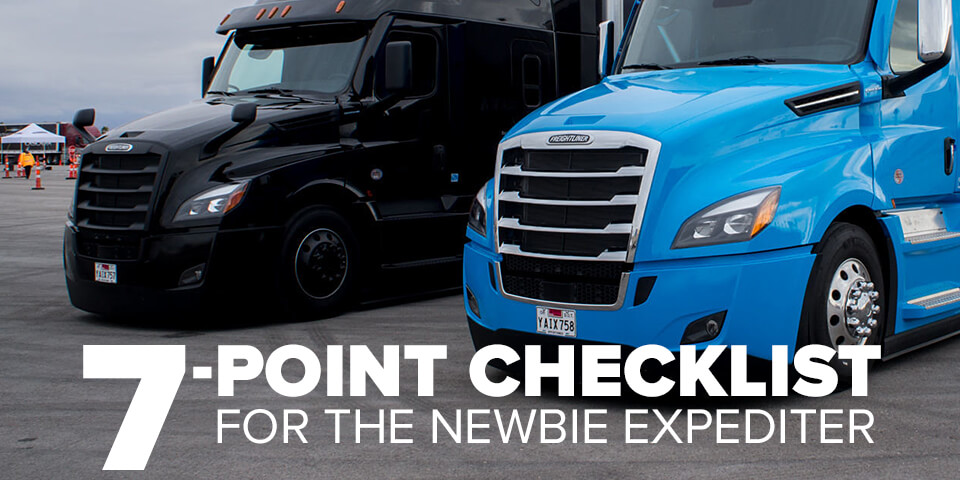
7-Point Checklist for the Newbie Expediter
If you do it right, expediting can be a lucrative and rewarding career where you can be your own boss, set your own schedule, and see the country on someone else's dime.
But if you're looking at expediting as just another job or a get-rich-quick business opportunity, watch out! You could be setting yourself up for failure before you even get started.
How can you determine whether you and expedited trucking could be a perfect match? Use this 7-point checklist.
#1. Does the expedite lifestyle fit you and your family?
Sure, expediting can be a great way to get paid to travel the country. But you'll also be out on the road and away from home for weeks at a time. Are you okay with that? Is your family okay with that?
While this business can be lucrative, there's also a lot of "hurry up and wait," where you deliver freight and then must sit and wait for days for your next load. Are you prepared to deal with the uncertainty that comes with inconsistent work hours (and cash flow)?
And if you're planning to run as a team, are you okay with living in close quarters with that person for weeks at a time?
As veteran owner-operator Scott Undercoffler, who runs team with his wife Fran, put it: "You're going to be living in an eight by eight box. And if you don't get along with the person, it can make or break you as far as your attitude. I've met people out here who drove with someone and, within a week, they had to get him out of the truck because they clashed so bad."
#2. Do you have a business owner mindset?
Even if you plan to drive for a fleet owner, in most cases, you'll be an independent contractor, not an employee. So, whether you're an owner-operator or driver, you're in business for yourself.
You're the CEO of "[Your Name], Inc." That means you have more freedom-and more responsibility for your own success.
So, if you want to put yourself in the best position to succeed in expediting, you must think like a business owner, willing to invest in yourself and your business to increase your income potential.
#3. Do you have a team of mentors in place?
This business will give you a rude awakening if you go into it blind. That's why is it vital to seek out mentors who can help show you the ropes.
"It's important to network with successful people in this industry before joining in," says solo owner-operator Greg Huggins. "You don't want to get advice from people who are not doing well."
And that's the key-seeking out successful expediters. These are the people who can tell you what expedited trucking is really like, how you can make money at it, and what pitfalls you should avoid.
These mentors can also help you sanity check your thinking before you decide to take the plunge: "With what you know about me so far, do you think that the expedite business is a good fit for me?"
#4. Do you have enough cash reserves?
You'll need access to cash for emergencies and working capital to help fill in any cash-flow gaps during the slow weeks, which will always come.
How much should you have in reserves?
A general rule of thumb: the bare minimum is three months expenses. But if you can save up more, that's even better. As Huggins puts it, "Ideally, you want six or eight months or even a year's worth of expenses while you try to get your business off the ground. If you go into it over-leveraged and something unexpected happens, you're going to sink."
(Read: "How to Build Your Cash Reserves to Succeed for the Long Haul.")
#5. Do you have solid credit?
Your credit score affects so many aspects of your business-such as your ability to buy a truck, your financing rates, your insurance costs, and so forth.
How do you get your credit score?
Many of your credit card companies give you free access to your credit score-and, in some cases, your full credit report-without negatively impacting your score. You're also entitled to one free credit report per year from each of the main credit reporting firms:
But if you have weak credit today, it's not the end of the world. You can start working on those issues today by paying down your debts.
(For specific tips on how to rebuild your credit, read "How to Strengthen Your Credit to Buy Your First Truck.")
#6. Are you a student of the business?
It's one thing to learn everything you can about the expedited trucking business before you get into it. But the industry is continually changing. And if you're not prepared to do what it takes to keep up with and adapt to the changes, you could get blindsided.
But if you're driven and disciplined to invest the time you need for continuous learning, you'll be setting yourself up for long-term success in expediting.
#7. Do you know your numbers?
What are your financial projections? How much revenue can you realistically expect to generate, especially when you're just getting started? What are your projected expenses? At what point would you break even?
Ask mentors to review your numbers and challenge your assumptions to ensure you've covered your bases and are being realistic. Otherwise, you risk putting yourself into a financial hole because of overly optimistic projections.
The Bottom Line
If you want to reap the rewards of the expedited trucking business, do everything you can to minimize the risks upfront. So, before going "all in," make sure the lifestyle fits your personality and goals, that you have the right mentality to win, and that you've built up the industry knowledge and financial strength you need to succeed.
